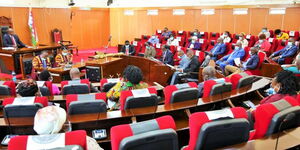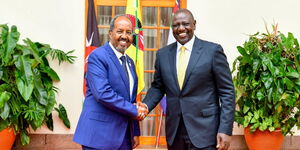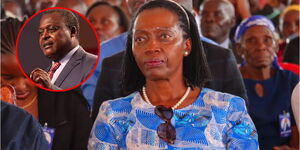Just days into his new role as Cabinet Secretary for Cooperatives and Micro, Small, and Medium Enterprises Development, Wycliffe Oparanya finds himself entangled in a legal battle that could see his appointment overturned. The former Kakamega Governor, appointed by President Ruto, is the subject of a court petition challenging his suitability for the Cabinet position.
The controversy stems from a recent decision by the Director of Public Prosecutions (DPP), Renson Ingonga, to drop corruption charges against Oparanya. The Ethics and Anti-Corruption Commission (EACC) had recommended prosecution, citing strong evidence of conflict of interest and money laundering.
According to the EACC, funds amounting to millions were allegedly funneled into Oparanya’s personal accounts, disguised as kickbacks from contractors working with the Kakamega County Government.
In a damning letter to the DPP, EACC chief executive officer Twalib Mbarak insisted that the evidence was “cogent enough” to meet the threshold for prosecution. The anti-graft body expressed frustration with the DPP’s decision to abandon the case, a move that has now prompted a legal challenge.
On Tuesday, August 13, Fredrick Mulaa, a concerned citizen, filed a petition at the anti-corruption division of the High Court. He argues that the DPP's decision to drop the charges was not only illegal but also compromised the principles of transparency, accountability, and integrity.
Mulaa contends that the charges against Oparanya were grounded in solid evidence and that the DPP's reversal was influenced by political considerations rather than the public interest.
Mulaa’s petition questions the timing of the DPP’s decision, pointing out that it coincided with Oparanya’s nomination to the Cabinet. He argues that the move to drop the charges without further investigation undermines the integrity of the DPP’s office and raises serious concerns about the influence of powerful individuals in the justice system.
The court filing also highlights the fact that Oparanya’s nomination disregarded critical material evidence related to his integrity. Mulaa asserts that the appointment process should have taken into account the unresolved corruption allegations, which could have disqualified Oparanya from holding public office.
The EACC had recommended charges against Oparanya for allegedly receiving Ksh56.7 million from a county contractor.
Oparanya, however, maintains that the funds in question were a loan from the contractor, not illicit kickbacks. This explanation, according to Mulaa, only adds to the suspicions surrounding the former governor’s financial dealings and raises questions about the transparency of his office.
Mulaa’s petition seeks to quash Oparanya’s appointment and demands that the court order a full review of the DPP’s decision to drop the charges. He argues that the DPP acted without proper consultation with the EACC, thereby violating legal guidelines and compromising the administration of justice.
Oparanya is not the only Cabinet Secretary facing legal challenges. Last week, the Kenya Human Rights Commission (KHRC) and activist Wanjiru Gikonyo filed a petition at the High Court seeking to nullify the appointments of President Ruto's entire Cabinet, including Oparanya.
The petition lists multiple reasons for this challenge, notably the claim that the vetting process that approved the Cabinet Secretaries' nominations lacked sufficient public participation.
The petition also raises serious integrity concerns, highlighting Oparanya's ongoing case with the EACC as a key example.
"Through a letter dated 31st July 2024 to the Director of Public Prosecutions, the EACC Chief Executive Officer raised integrity concerns about the 20th Interested Party (Oparanya)," the petition states.












